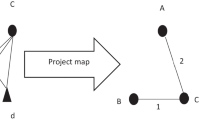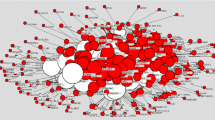Abstract
The paper investigates the influence of the alumni social network of mutual fund managers on fund performance in India. The alumni networks of 211 managers managing 585 funds are constructed through seven network centrality measures for the period from April 2013 to March 2022. The study finds that fund managers who are more central to the network on average generate higher risk-adjusted excess return performance (alpha) and take a higher level of idiosyncratic risk. Although the centrality position of managers does not influence them in selecting small-capitalisation, value, and high market-beta stocks, more central fund managers tend to pick momentum stocks. The results affirm that the information advantages in the central position of alumni social networks improve fund performance, influence the managers’ investment style and enable higher risk-taking behaviour. The contribution of the paper is that the findings regarding investment style and fund flows are different than those of developed markets which may be relevant for other emerging markets.



Similar content being viewed by others
Notes
The Association of Mutual Funds in India (AMFI) is regulator of the Indian Mutual Fund Industry, dedicated to protecting and promoting the interests of mutual funds and their unit holders. https://www.amfiindia.com/indian-mutual#:~:text=Assets%20Under%20Management%20(AUM)%20of,a%20span%20of%2010%20years.
Databank on Global Financial Development, The World Bank. https://databank.worldbank.org/source/global-financial-development/Series/GFDD.DI.07.
Securities and Exchange Board of India, regulator of Indian securities market. Web source: www.sebi.gov.in.
ICRA Report on “Mutual Fund Screener 2022”. https://www.icraanalytics.com/img/PDF/MF/Mutual%20Fund%20Screener.pdf.
The ACE mutual fund database is a popular data providing service in India which covers 44 asset management.
companies (AMCs) and more than 12,000 schemes which are currently prevalent in India.
Data Library for Indian Market, maintained by IIM Ahmedabad. http://www.iimahd.ernet.in/~iffm/Indian-Fama-French-Momentum/.
UCINET is a software for the analysis of social network data. Weblink: https://sites.google.com/site/ucinetsoftware/home
Closeness centrality measures the quality of the connections of fund managers through the importance of the other connected managers in the network.
References
Blundell, R., & Bond, S. (1998). Initial conditions and moment restrictions in dynamic panel data models. Journal of Econometrics, 87(1), 115–143.
Borgatti, S. P., Everett, M. G., & Johnson, J. C. (2018). Analyzing social networks. Sage.
Brass, D. J., & Burkhardt, M. E. (1992). Centrality and power in organizations. Networks and Organizations: Structure, Form, and Action, 191(215), 198–213.
Brown, D. P., & Wu, Y. (2016). Mutual fund flows and cross-fund learning within families. The Journal of Finance, 71(1), 383–424.
Butts, C. T. (2009). Revisiting the foundations of network analysis. Science, 325(5939), 414–416.
Cai, J., Walkling, R. A., & Yang, K. (2016). The price of street friends: Social networks, informed trading, and shareholder costs. Journal of Financial and Quantitative Analysis, 51(3), 801–837.
Carhart, M. M. (1997). On persistence in mutual fund performance. The Journal of Finance, 52(1), 57–82.
Chahine, S., Fang, Y., Hasan, I., & Mazboudi, M. (2019). Entrenchment through corporate social responsibility: Evidence from CEO network centrality. International Review of Financial Analysis, 66, 101347.
Chen, W., Ho, K.-C., & Yang, L. (2020). Network structures and idiosyncratic contagion in the European sovereign credit default swap market. International Review of Financial Analysis, 72, 101594.
Chen, Y., Huang, J., Li, T., & Pittman, J. (2022). It’s a small world: The importance of social connections with auditors to mutual fund managers’ portfolio decisions. Journal of Accounting Research, 60(3), 901–963.
Chou, P.-I., & Lee, C.-H. (2012). Is concentration a good idea? Evidence from active fund management. Asia-Pacific Financial Markets, 19, 23–41.
Clare, A., Sherman, M., O’Sullivan, N., Gao, J., & Zhu, S. (2022). Manager characteristics: Predicting fund performance. International Review of Financial Analysis, 80, 102049. https://doi.org/10.1016/j.irfa.2022.102049
Cohen, L., Frazzini, A., & Malloy, C. (2008). The small world of investing: Board connections and mutual fund returns. Journal of Political Economy, 116(5), 951–979.
Coleman, J. S. (1988). Social capital in the creation of human capital. American Journal of Sociology, 94, S95–S120.
Coval, J. D., & Moskowitz, T. J. (2001). The geography of investment: Informed trading and asset prices. Journal of Political Economy, 109(4), 811–841.
Fama, E. F., & French, K. R. (2010). Luck versus skill in the cross-section of mutual fund returns. The Journal of Finance, 65(5), 1915–1947.
Gao, X., Wong, T. J., Xia, L., & Yu, G. (2014). Friends with close ties: asset or liability? Evidence from the investment decisions of mutual funds in China. Harvard Business School Working Paper.
Gu, Z., Li, Z., Yang, Y. G., & Li, G. (2019). Friends in need are friends indeed: An analysis of social ties between financial analysts and mutual fund managers. The Accounting Review, 94(1), 153–181.
Hochberg, Y. V., Ljungqvist, A., & Lu, Y. (2007). Whom you know matters: Venture capital networks and investment performance. The Journal of Finance, 62(1), 251–301.
Hong, H., Kubik, J. D., & Stein, J. C. (2005). Thy neighbor’s portfolio: Word-of-mouth effects in the holdings and trades of money managers. The Journal of Finance, 60(6), 2801–2824.
Ingram, P., & Zou, X. (2008). Business friendships. Research in Organizational Behavior, 28, 167–184.
Kuhnen, C. M. (2009). Business networks, corporate governance, and contracting in the mutual fund industry. The Journal of Finance, 64(5), 2185–2220.
Li, X., & Hou, K. (2023). Over-weighting risk factor augmented with mutual fund managers’ social networks. Pacific-Basin Finance Journal, 77, 101914.
Liang, Q., Liao, J., & Ling, L. (2022). Social interactions and mutual fund portfolios: The role of alumni networks in China. China Finance Review International, 12(3), 433–450.
Lin, J., Wang, F., & Wei, L. (2021). Alumni social networks and hedge fund performance: Evidence from China. International Review of Financial Analysis, 78, 101931.
Liu, H., Liu, K., Li, D., & Li, Y. (2020). Fund managers’ association networks, information sharing and fund performance. Applied Economics Letters, 27(10), 841–847.
Ozsoylev, H. N., Walden, J., Yavuz, M. D., & Bildik, R. (2014). Investor networks in the stock market. The Review of Financial Studies, 27(5), 1323–1366.
Pavithra, S., & Kayal, P. (2023). A Study of Investment Style Timing of Mutual Funds in India. Asia-Pacific Financial Markets, 30(1), 49–72.
Pool, V. K., Stoffman, N., & Yonker, S. E. (2012). No place like home: Familiarity in mutual fund manager portfolio choice. The Review of Financial Studies, 25(8), 2563–2599.
Pool, V. K., Stoffman, N., & Yonker, S. E. (2015). The people in your neighborhood: Social interactions and mutual fund portfolios. The Journal of Finance, 70(6), 2679–2732.
Qi, T., Li, J., Xie, W., & Ding, H. (2020). Alumni networks and investment strategy: Evidence from Chinese mutual funds. Emerging Markets Finance and Trade, 56(11), 2639–2655.
Rossi, A. G., Blake, D., Timmermann, A., Tonks, I., & Wermers, R. (2018). Network centrality and delegated investment performance. Journal of Financial Economics, 128(1), 183–206.
Sirri, E. R., & Tufano, P. (1998). Costly search and mutual fund flows. The Journal of Finance, 53(5), 1589–1622.
Uzzi, B. (1996). The sources and consequences of embeddedness for the economic performance of organizations: The network effect. American Sociological Review. https://doi.org/10.2307/2096399
Zhu, A. (2016). Social connections and information production: Evidence from mutual fund portfolios and performance. Available at SSRN 2831746.
Author information
Authors and Affiliations
Corresponding author
Additional information
Publisher's Note
Springer Nature remains neutral with regard to jurisdictional claims in published maps and institutional affiliations.
Appendices
Appendix 1: Example of Manager Bios extracted and analysed in this study-
We present a few examples of fund managers' information available on the internet, from where we extract the personal characteristics of the managers, without exposing their identity.
Extracted personal details of Manager.
1.1 Manager 1
XXXX is a Fund Manager and Senior Analyst with XXXX AMC Limited (XXXX). He has an overall experience of 13 years in the equity and capital market space. XXXX joined XXXX in February 2011 as a part of the Equity Fund Management and Analyst team. He specializes in the Banking and Financial Services sector. Prior to joining XXXX, XXXX worked with XXXX Securities Limited and XXXX Private Limited. XXXX holds an MBA in Finance from IIM Indore.
1.2 Manager 2
Mrs. XXXX is a Bachelor of Commerce & Master of Business Administration. She has been with XXXX AMC for over 20 years. She has been a Fund Manager since June 2004. Prior experience includes Fund Management of Equity, Balanced and Offshore Equity Funds, Macro Research, Quantitative Analysis and Corporate Financial Planning. Her previous assignment was with XXXX Industries Ltd in the Financial Planning Cell.
1.3 Manager 3
XXXX is the Head of Equity at XXXX AMC. He joined XXXX AMC in 2009 as an Equity Fund Manager and worked his way to Head of Equity in 2016. He currently manages the flagship XXXX Long Term Equity Fund amongst other funds. Prior to XXXX AMC, Jinesh was associated with XXXX AMC as a Portfolio Manager, where he was responsible for alternative assets across the growth, value and dividend basket, from June 2008 to October 2009. He was also associated with XXXX India Capital as a Sr. Research Analyst responsible for the BFSI & Infrastructure sector and held a sectorial portfolio manager role for investments. He was with XXXX India Capital from XXXX to XXXX.
1.4 Manager 4
Mr. XXXX, CIO, XXXX Mutual Fund was ranked as one of the top 5 equity fund managers in 2018 by ET Wealth—Morningstar. With an experience of XX years, he prefers quality businesses with differentiated offerings and a significant competitive edge over peers. Mr XXXX has proven his mettle while dealing with such situations and has delivered consistent returns over the years. Prior to joining XXXX Financial Services, he was Head of Equities at XXXX Mutual Fund. His previous assignments include Chief Investment Officer at XXXX Global Services and XXXX Capital and Co-Head—Equities with XXXX Investment Managers Private Limited. Mr. XXXX holds a Post Graduate Diploma in Management from IIM Bangalore and a degree in B.E (XXXX) Engineering from XXXX.
Appendix 2: Top UG and PG Colleges of Fund Managers
2.1 Top 5 UG Colleges
Colleges | No |
|---|---|
University of Mumbai | 112 |
Narsee Monjee College of Commerce and Economics | 59 |
St. Xavier’s College (Autonomous), Kolkata | 32 |
IIT Madras | 26 |
IIT Bombay | 23 |
2.2 Top 5 PG Colleges
Colleges | No |
|---|---|
University of Mumbai | 79 |
IIM Ahmedabad | 76 |
IIM Bangalore | 76 |
SVKM’s Narsee Monjee Institute of Management Studies (NMIMS) | 48 |
IIM Lucknow | 48 |
IIM Calcutta | 47 |
Rights and permissions
Springer Nature or its licensor (e.g. a society or other partner) holds exclusive rights to this article under a publishing agreement with the author(s) or other rightsholder(s); author self-archiving of the accepted manuscript version of this article is solely governed by the terms of such publishing agreement and applicable law.
About this article
Cite this article
Majumdar, S., Kundu, S., Bose, S. et al. Network Nexus: Exploring the Impact of Alumni Connections of Managers on Mutual Fund Performance in India. Asia-Pac Financ Markets (2023). https://doi.org/10.1007/s10690-023-09435-6
Accepted:
Published:
DOI: https://doi.org/10.1007/s10690-023-09435-6




